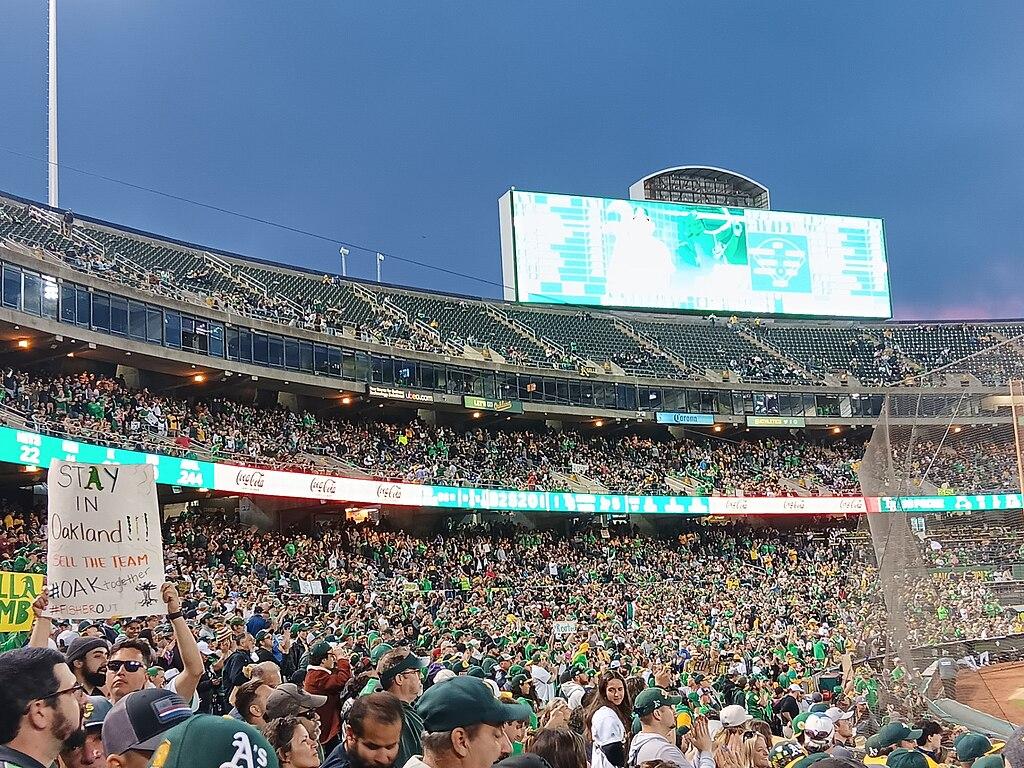In a controversial decision that has stirred discussions among fans and commentators alike, Major League Baseball has officially removed the recording of the Oakland Athletics’ much-publicized “reverse boycott” game from its official archives. The game, held earlier this season, was notable not only for its passionate display of fan support amidst ongoing concerns about the franchise’s future in Oakland but also for the underlying tensions surrounding the team’s ownership and relocation talks. The removal, detailed in an article by Awful Announcing, raises questions about the implications for historical records and the narrative of baseball culture, as well as the lengths to which leagues may go in shaping their image. As fans and analysts react to this unprecedented move, the broader context of franchise loyalty and the evolving landscape of Major League Baseball remains in the spotlight.
A’s Reverse Boycott Game Asserts Fan Power in Struggling Franchise
The recent “reverse boycott” game has surged in significance as a powerful statement from fans of the Oakland Athletics, a franchise struggling both on and off the field. With a remarkable turnout that defied expectations, supporters filled the stands to voice their love for the team while simultaneously pressuring ownership to prioritize their commitment to the Oakland community. The event showcased a profound connection between the fans and the players, as they rallied together to demand change amidst ongoing talks of relocation and market decline.
Fans participated in various activities to amplify their messages, forming a palpable sense of unity throughout the stadium. The highlights of the event included:
- Fan Chants: Supporters created an electric atmosphere with synchronized chants calling for better management.
- Creative Signs: Many displayed handmade signs expressing their desire to keep the team in Oakland.
- Community Spirit: Local vendors benefited from increased foot traffic, showcasing how the fanbase’s commitment extended beyond just the game.
This game, now removed from MLB archives, represents a significant chapter in the ongoing narrative of fan engagement and ownership responsibility within Major League Baseball. With the spotlight cast on the A’s franchise, it remains to be seen how ownership will respond to the clear demands of their loyal supporters.
- Advertisement -
The Implications of Excluding Historic Events from MLB Archives
The recent decision to exclude the A’s reverse boycott game from MLB archives raises significant concerns about how the league defines and preserves its history. By removing a high-profile game that symbolized both fan mobilization and dissent against a struggling franchise, MLB risks minimizing the impact of such movements on the sport and its followers. This omission can create a distorted narrative where only positive occurrences are highlighted, effectively silencing the voices of fans advocating for change. The implications of this selective archiving are far-reaching, potentially alienating passionate supporters and downplaying the socio-cultural facets of baseball that extend beyond mere statistics.
Additionally, excluding these events can lead to a fragmented understanding of league dynamics and community engagement. Important milestones and fan-led initiatives that challenge organizational decisions should be recorded and analyzed to foster a transparent relationship between Major League Baseball and its audience. The selective retention of historical data not only undermines the archival integrity of the league but also poses the risk of repeating past mistakes. MLB should consider the broader consequences of erasing such pivotal moments, as they serve as vital lessons for both the organization and its loyal fanbase.
Recommendations for Preserving Fan Engagement and Historical Context in Sports Documentation
To foster lasting connections between fans and the sport while preserving vital historical narratives, several strategies must be implemented. Transparency is key; organizations should prioritize open communication about decisions affecting archival content. This includes meticulous documentation of notable events, particularly ones that resonate deeply with the community, like the recent reverse boycott game. By maintaining an updated digital archive, fans can easily access and reflect upon significant games, player records, and moments that symbolize broader socio-economic contexts within the sport.
Engaging fans actively in the preservation process can amplify their sense of ownership and belonging. Consider initiatives such as:
- Advertisement -
- Fan-driven content creation: Encourage supporters to share their personal experiences or recollections of specific games.
- Collaborative digital archives: Create platforms where fans can submit photographs, videos, and memorabilia.
- Educational programs: Organize events that highlight key moments in sports history, utilizing expert panels that merge fan stories with historical analysis.
By embracing technology and community involvement, sports organizations can effectively safeguard fan engagement while honoring the rich tapestry of history that shapes each game.
To Wrap It Up
In a surprising turn of events, Major League Baseball has officially removed the highly-publicized reverse boycott game involving the Oakland A’s from its archives, sparking a wave of discussions among fans and analysts alike. This unprecedented decision raises questions about the league’s commitment to transparency and its ongoing struggle with the perception of the A’s organization. As controversies surrounding ownership, stadium issues, and fan engagement continue to dominate headlines, this incident adds another layer to the intricate narrative of Major League Baseball and its franchises. Moving forward, it remains to be seen how this removal will impact the A’s fanbase and the ongoing dialogue about the future of baseball in Oakland. As the situation unfolds, analysts and supporters alike will be closely monitoring the implications of this decision and its potential effects on the relationship between the league, its teams, and their loyal followers.


